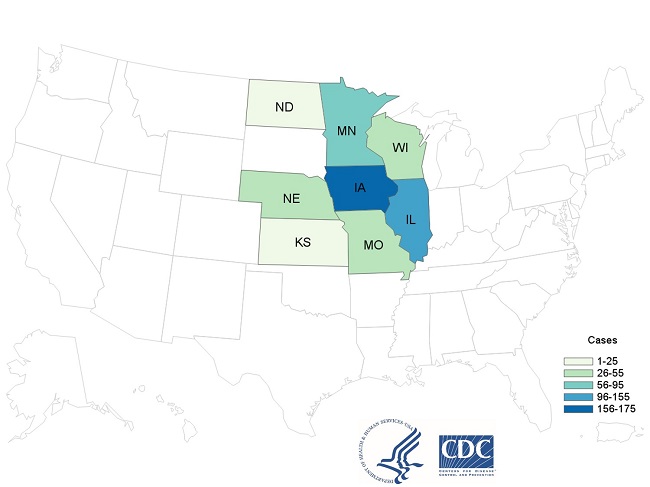Since the last case count update on June 26, 2020, 303 new laboratory confirmed Cyclospora infections have been reported.
The CDC reported today that as of July 8, 2020, a total of 509 people with laboratory confirmed Cyclospora infections associated with this outbreak have been reported from 8 states: Illinois (151), Iowa (160), Kansas (5), Minnesota (63), Missouri (46) Nebraska (48), North Dakota (6), and Wisconsin (30).

Illnesses started on dates ranging from May 11, 2020 to July 1, 2020. Ill people range in age from 11 to 92 years with a median age of 60 and 53% are female. Of 506 people with available information, 33 people (7%) have been hospitalized. No deaths have been reported.
Additionally, the Public Health Agency of Canada is investigating an outbreak of Cyclospora infections occurring in three Canadian provinces where exposure to certain Fresh Express brand salad products containing iceberg lettuce, carrots and red cabbage, has been identified as a likely source of the outbreak. Thirty-seven have reported illnesses.
Epidemiologic and traceback evidence continues to indicate that bagged salad mix containing iceberg lettuce, carrots, and red cabbage produced by Fresh Express is a likely source of this outbreak.
In interviews, ill people answered questions about the foods they ate and other exposures in the two weeks before they became ill. Ill people reported eating a variety of brands of bagged salad mix containing iceberg lettuce, carrots, and red cabbage. Salad mixes eaten by ill people were purchased from ALDI, Hy-Vee, Jewel-Osco, and Walmart stores in the Midwest.
Traceback investigations by FDA suggest that the Streamwood, Illinois Fresh Express production facility is the likely producer of the bagged salad mixes eaten by ill people. FDA has begun an inspection at this facility. CDC and FDA continue to investigate to determine which ingredient or ingredients in the salad mix was contaminated and whether other products are a source of illnesses.